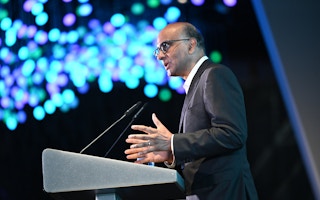There is still, around the world, a prevailing culture of climate inaction or wanting to postpone action in the hope that things get better, observed Singapore’s President Tharman Shanmugaratnam. But there is equally a tendency for the opposite, when people talk about an impending crisis that is coming – hoping to “shock others into action”.
To continue reading, subscribe to Eco‑Business.
There's something for everyone. We offer a range of subscription plans.
- Access our stories and receive our Insights Weekly newsletter with the free EB Member plan.
- Unlock unlimited access to our content and archive with EB Circle.
- Publish your content with EB Premium.
Both mindsets breed inaction and should be avoided, he suggested.
“Most studies show that simply scaring people by talking about catastrophe or driving people to despair does not lead to action. It leads to ‘lying flat’”, said Shanmugaratnam. He was making reference to a phrase – ”tang ping” (躺平) in the Chinese language – now commonly used by youths in China when they are so disillusioned with life that they decide to do nothing.
Speaking at the welcome dinner of the Temasek-organised annual Ecosperity sustainability summit, Shanmugaratnam highlighted significant progress the world has achieved in taking climate action. Governments have moved on climate, and so have companies, he said, but this shouldn’t lead to “complacent optimism”.
Here are five other messages on climate that the President shared in his keynote address:
1. Remodel economies. Think of philanthropy as risk capital.
Shanmugaratnam called for different countries to work together to solve common problems focused on sustainability and equity. At the same time, he said there needs to be a shift in how we think about philanthropy.
Philanthropy should not be thought of as just doing good through charitable donations, said Shanmugaratnam. Instead, the public, private and philanthropic sectors should “take risks and expect rewards together” through co-investment. “It’s a huge opportunity to remodel what we think of as a market economy,” he said.
“
We cannot solve this global [climate] challenge without a class of investors that have the ability to take risk on early stage innovations, the ability to take a long view of returns, and the ability to think not only of financial returns, but social returns.
2. Shift the politics of climate change from talking about the costs we pay today to avoid costs in the distant future, to the benefits we get today.
These benefits include economic growth, job creation, improved crop yields, clean air and also protection from extreme weather events, said Shanmugaratnam, which are advantages that people in Asia can already enjoy if investments are put into decarbonisation or environmental projects.
Shanmugaratnam described it as an opportunity for a new era of growth that shouldn’t be neglected.
“
The trillions of dollars we talk about as being necessary for us to achieve net zero, these are not a cost. They are an investment for growth, jobs and an inclusive future.
3. Don’t just solve for climate. Solve for water and biodiversity.
A positive feedback loop can be created by addressing all three together, said Shanmugaratnam.
Biodiversity provides many other benefits to the human species and natural capital should be valued. “We should eventually have it on our books and account for it,” he said.
4. Transition pathways are critical. Don’t just set distant climate goals.
It is highly likely that the world is underestimating the scale of global warming that is going to take place.
This is because the best climate models, including the models of the Intergovernmental Panel of Climate Change (IPCC), the scientific group assembled by the United Nations to monitor and assess all global science related to climate change, are not based on sufficient data from the last 50 years of climate extremities, said Shanmugaratnam. “We also don’t have the data or models to estimate what happens when we cross tipping points.”
He called for clear transition pathways to be in place, rather than just faraway climate goals. “Every tenth of a percentage point, or every 0.1 degrees centigrade, counts.”
Based on current projections, policies and actions driven by the corporate sector will only help the world achieve 5 per cent of the reduction in carbon emissions that need to be achieved by 2030 to reach net zero in 2050.
“
The only choice we face is between an orderly transition and a disorderly transition. And we are currently on the path to an extremely disorderly transition globally beyond 2030.
5. Consumers can make simple changes without reducing their standard of living.
For example, change to no-beef diets, suggested Shanmugaratnam, as he made reference to the night’s dinner menu which did not offer the meat, which is known to produce the most greenhouse gas emissions, including methane.
“In fact, it [not eating beef] should increase our standard of living because we will probably get healthier as well,” he said.
Shanmugaratnam also spoke about the fast fashion industry. “We don’t focus on the textile industry enough. As an individual in my late 60s, I don’t think I should be lecturing people about how often they should change what they are wearing. But at the very least, we can go for circularity.”
He advocated for innovation not just towards renewables, but across every sector of the economy. For example, he said: “We need a new green revolution in agriculture. One of the solutions is to revolutionise rice farming and to decarbonise rice planting, and also go for rice strains and cultivation methods that involve far less water use. It can be achieved,” he said.

















